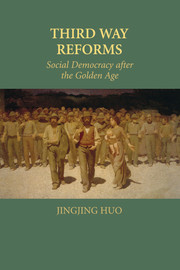Book contents
- Frontmatter
- Contents
- Tables and Figures
- Acknowledgments
- 1 Introduction
- 2 Theorizing the Third Way
- 3 Constraints on Action: Institutions and Ideas
- 4 Prelude to the Third Way: The Unemployment Problem and Earlier Responses
- 5 Expansion in Active Protection
- 6 Restructuring Passive Protection
- 7 Economic and Corporatist Contexts for the Third Way
- 8 Conclusion: Theories of Possibilities
- References
- Index
2 - Theorizing the Third Way
Published online by Cambridge University Press: 20 February 2010
- Frontmatter
- Contents
- Tables and Figures
- Acknowledgments
- 1 Introduction
- 2 Theorizing the Third Way
- 3 Constraints on Action: Institutions and Ideas
- 4 Prelude to the Third Way: The Unemployment Problem and Earlier Responses
- 5 Expansion in Active Protection
- 6 Restructuring Passive Protection
- 7 Economic and Corporatist Contexts for the Third Way
- 8 Conclusion: Theories of Possibilities
- References
- Index
Summary
THEORY OF THIRD WAY IDEOLOGY
The Social Democratic Ideology
In order to properly evaluate the third way, I first examine the ideology of social democracy in general and then explain how its adaptation through time leads to the third way. There are some recurring key themes in social democratic ideology and discourse, such as social justice, fairness, solidarity, and egalitarianism. To serve as defining properties of social democracy, these concepts must have sufficient discriminating power to differentiate between social democracy and alternative values. On its own, neither social justice nor fairness satisfies this requirement. Clearly, no parties or interest groups advocate injustice or unfairness. By comparison, both solidarity and egalitarianism have more limited constituencies, and the varying importance accorded to these values is often crucial in determining what is socially just or fair for one party rather than another. Therefore, I will focus on them as two key philosophical principles that define social democracy and its adaptation through time.
By examining eight countries over a century, Steinar Stjernø (2005) identified solidarity as a principle shared but interpreted differently by social and Christian democracy. He traced the origin of solidarity as a valueladen discourse to French classic social theory, especially Auguste Comte's ([1852] 1973) idea of debt to past generations and Émile Durkheim's ([1893] 1984) mechanical and organic variants of solidarity. While Durkheim's mechanic solidarity is premised on homogeneity and common consciousness in closed primitive societies, the growing division of labor and specialization in modern societies leads to organic solidarity, based on interdependence between complementary skills.
- Type
- Chapter
- Information
- Third Way ReformsSocial Democracy After the Golden Age, pp. 7 - 50Publisher: Cambridge University PressPrint publication year: 2009



